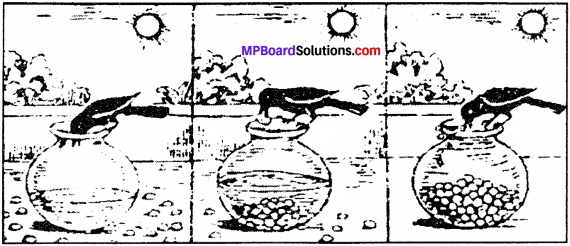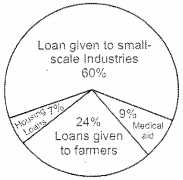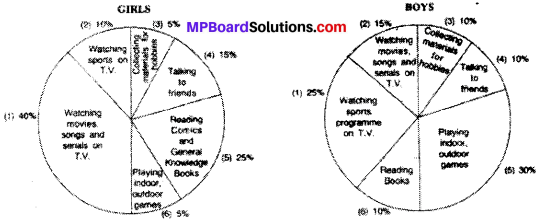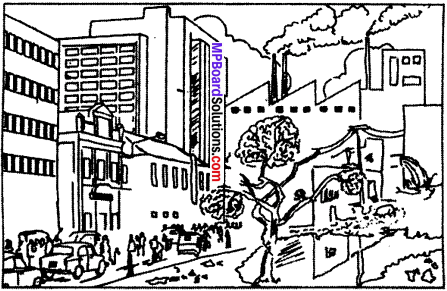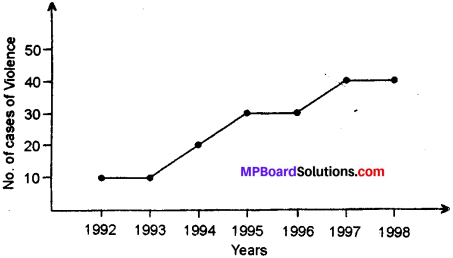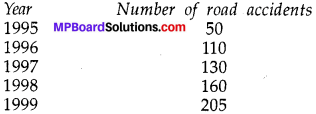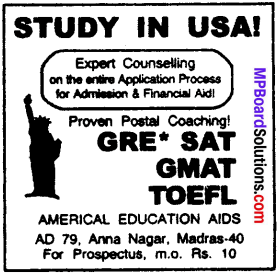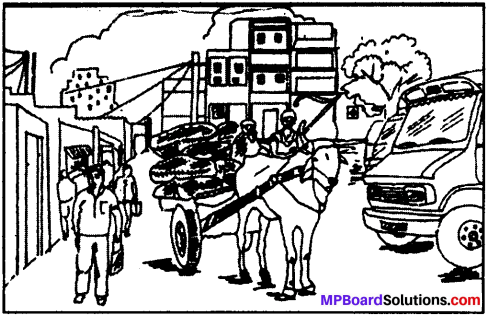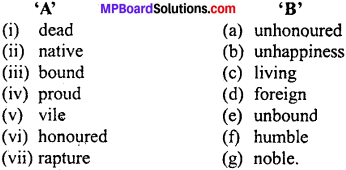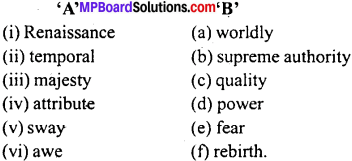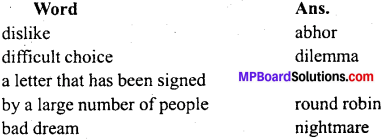In this article, we will share MP Board Class 10th Hindi Book Solutions Chapter 19 सन्नाटा (उषाराज सक्सेना) Pdf, These solutions are solved subject experts from latest edition books.
MP Board Class 10th Hindi Vasanti Solutions Chapter 19 सन्नाटा (उषाराज सक्सेना)
सन्नाटा पाठ्य-पुस्तक के प्रश्नोत्तर
सन्नाटा लघु-उत्तरीय प्रश्नोत्तर
प्रश्न- 1.
कवियित्री को परदेश में कैसा अनुभव होता है?
उत्तर
कवियित्री को परदेश में अकेलेपन का अनुभव होता है।
प्रश्न 2.
जलता हुआ बल्ब सन्नाटे में कैसा लग रहा है?
उत्तर
जलता हुआ बल्ब आँखों में ठहरा हुआ आँसू जैसे पलकों पर लटक गया है।
प्रश्न 3.
‘तुम्हारी विरासत’ कवियित्री के पास क्या शेष बचा है?
उत्तर
‘तुम्हारी विरासत’ कविता में कवियित्री के पास बची हुई जिंदगी का एक टुकड़ा शेष बचा है।
प्रश्न 4.
स्मृतियों की आहट से क्या अनुभव होता है?
उत्तर
‘स्मृतियों की आहट से’ हमें नई जिंदगी जीने की सुबह का अनुभव होता है।
सन्नाटा दीर्य-उत्तरीय प्रश्नोत्तर
प्रश्न 1.
‘शब्द समूह खो गया है।’ पंक्ति का भाव स्पष्ट कीजिए।
उत्तर
‘शब्द-समूह खो गया है। पंक्ति का भाव यह है कि आज अकेलापन चारों ओर फैल गया है।
प्रश्न 2.
जलता हुआ प्रश्न चिह्न किसे कहा गया है? और क्यों?
उत्तर
‘जलता हुआ प्रश्न चिह्न’ अकेलापन और उदासीपन को कहा गया है।
प्रश्न 3.
‘सन्नाटा’ कविता का सारांश अपने शब्दों में लिखिए।
उत्तर
देखिए सन्नाटा का सारांश।
प्रश्न 4.
कवियित्री अँधेरे से क्या छीन कर लाई हैं?
उत्तर
कवियित्री अँधेरे से बची हुई जिंदगी का एक टुकड़ा छीन कर लाई हैं।
![]()
प्रश्न 5.
‘कवयित्री सन्नाटा से बिलकुल भयभीत नहीं है।’ स्पष्ट कीजिए।
उत्तर
कवियित्री सन्नाटे से बिलकुल भयभीत नहीं है। यह इसलिए कि उसे सुबह की नई किरणों से जिंदगी में नए आहट आने की पूरी आशा है।
प्रश्न 6.
‘तुम्हारी विरासत’ कविता हमें क्या सन्देश देती है?
उत्तर
‘तुम्हारी विरासत’ कविता का संदेश है-‘निराशा के घोर अंधकार अपने भीतर आशा की एक किरण अवश्य प्रकाशित कर लेना चाहिए।
प्रश्न 7.
कवियित्री ने अपनी तुलना जले हए कोयले से क्यों की है?
उत्तर
कवियित्री ने अपनी तुलना जले हुए कोयले से की है। यह इसलिए कि उसकी राख में एक नन्हीं-सी सुर्ख चिंगारी तिड़कने का खामोशी से इंतजार कर रही है।
सन्नाटा भाषा-अनुशीलन
प्रश्न 1.
भाव सौंदर्य लिखिए
‘आँख में ठहरा हुआ आँसू
पलकों पर लटक गया है।’
उत्तर
उपर्युक्त पद्यांश की भाव-योजना बिंबात्मक है। आँखों में ठहरा हुआ आँसू पलकों पर लटक गया है द्विविधा और अनजान की स्थिति को उजगार करने में अधिक रोचक लग रहा है।
प्रश्न 2.
आशय स्पष्ट कीजिए
(क) बची हुई जिंदगी का एक टुकड़ा
(ख) स्मृतियों के पद चाप।
उत्तर
(क) उपर्युक्त पद्यांश का आशय है-जिंदगी में कुछ नहीं है, फिर भी जो कुछ थोड़ा है, वही बहुत है।
(ख) उपुर्यक्त पद्यांश का आशय है-यादों के लौट आने के प्रति आशावान बनकर एकाकी जिंदगी को खुशहाल बनाया जा सकता है।
![]()
प्रश्न 1.
शुद्ध वर्तनी कीजिए
मुरख, खमोसी, आँख, स्मृतियाँ, खिड़कियाँ, बल्व ।
उत्तर
अशुद्ध वर्तनी – शुद्ध वर्तनी
मुरख – मूर्ख
खमोसी – खामोसी
आंख – आँख
खिड़कीयाँ – खिड़कियाँ
बल्ब – बल्ब।
प्रश्न 4.
निम्नलिखित शब्दों के विलोम शब्द लिखिए
अँधेरा, स्मृति, आदि, आस्था।
उत्तर
शब्द – विलोम शब्द
अँधेरा – उजाला
स्मृति – विस्मृति
आदि – अंत
आस्था – अनास्था।
सन्नाटा योग्यता-विस्तार
प्रश्न 1. जीवन के प्रति आशावादी दृष्टिकोण वाली अन्य कविताएँ खोज कर पढ़िए।
प्रश्न 2. इन कविताओं को पढ़कर आपको क्या प्रेरणा मिलती है? अपने शब्दों में लिखिए।
उत्तर
उपर्युक्त प्रश्नों को छात्र/छात्रा अपने अध्यापक/अध्यापिका की सहायता से हल करें।
सन्नाटा परीक्षोपयोगी अतिरिक्त प्रश्नोत्तर
अर्वग्रहण संबंधी प्रश्नोत्तर
प्रश्न 1.
‘सन्नाटा’ कविता का प्रतिपाद्य स्पष्ट कीजिए।
उत्तर
प्रस्तुत कविता प्रवासी कवियित्री उषाराज सक्सेना की एक महत्त्वपूर्ण कविता है। इस कविता में कवियित्री उषाराज सक्सेना बड़ी ही सावधानीपूर्वक परदेश में रहने की आत्मपीड़ा की हैरानी का उल्लेख किया है। कवियित्री का मानना है कि परदेश का भाव किसी से जुड़ा हुआ नहीं है, मन का निर्वासन भी कभी-कभी परदेश में रहने का अनुभव दे जाता है। जब मन में यह निर्वासन आता है, तब चारों ओर निस्तब्धता छायी ज्ञात होने लगती है। इस निर्वासन में अपने प्रति जगाई गई आस्था में भी दरार आने लगती है, अपनी शक्तियों पर भी कभी-कभी अविश्वास जागने लगता है। कविता के अंत में अपनी आत्मशक्तियों की चिंगारी का अनुभव कवियित्री को होता है, किंतु इसमें भी उसे संदेह है कि कहीं यह चिंगारी बुझ न जाए। कविता समकालीन जीवन में चारों ओर व्याप्त रहे एकाकीपन को ध्यान में रख करके रची गई है।
प्रश्न 2.
‘तुम्हारी विरासत’ कविता उषा वर्मा की एक अत्यधिक चर्चित कविता है?
उत्तर
कविता को पढ़ने से यह सुस्पष्ट हो जाता है कि कविता का काव्य स्वर आस्थावादी है। कवियित्री ने प्रस्तुत कविता में स्पष्ट किया है कि भले ही निराशा का गहरा अँधेरा हो, किंतु इस अँधेरे में भी हमें अवश्य ही एक किरण अपने भीतर प्रकाशित कर लेना चाहिए। सन्नाटे के भीतर किसी के आने की पदचाप सनने की ललक हमें जीवन-बोध से भरे रहती है। सुबह का इंतजार जीवन की ऊष्मा से संपन्न होकर ही किया जा सकता है, हमें अपनी भीतर यह ऊष्मा बचाए रखना है।
प्रश्न 3.
दिए गए कथनों के लिए दिए गए विकल्पों में से सही विकल्प चयन कीजिए।
1. परदेश में नहीं खटकता है
1. काँटा
2. बुर
3. साँकल
4. आवाज।
उत्तर
(3) साँकल
2. शब्द-समूह है
1. खो गया
2. आ गया
3. भा गया
4. बिगड़।
उत्तर
(1) खो गया
3. हवा हो गई है
1. तेज
2. बहरी
3. गूंगी
4. हल्की ।
उत्तर
(2) बहरी
![]()
4. आकाश हो गया है
1. साफ
2. बहरा
3. धुंधला
4. नीला।
उत्तर
(2) बहरा
5. दीवारें हो गई हैं
1. दीली
2. कमजोर
3. ठोस
4. बड़ी।
उत्तर
(3) ठोस
प्रश्न 4.
रिक्त स्थानों की पूर्ति दिए गए विकल्पों में से उचित शब्दों के चयन से कीजिए।
1. खिड़कियाँ …………….है। (खुली, बंद)
2. आँखों का ठहरा हुआ आँसू ……………… लटक गया है। (गालों पर, पलकों पर)
3. छत से अकेला ………………रहा है। (पंखा, बल्च)
4. एक जलता हुआ ……………… लगता है। (प्रश्न चिहून, अभाव चिहन)
5. बची हुई जिंदगी का ……………… है। (एक टुकड़ा, एक रूप)
उत्तर
- बंद
- पलकों पर
- बल्व
- प्रश्न चिह्न
- एक टुकड़ा।
प्रश्न 4.
सही जोड़ी का मिलान कीजिए
सरस्वती – दुष्यंत कुमार
विनयपत्रिका – डॉ. प्रेम भारती
सेगाँव का संत – महावीर प्रसाद द्विवेदी
वीरांगना दुर्गावती – तुलसीदास
छोटे-छोटे सवाल – श्रीमन्नारायण अग्रवाल
उत्तर
सरस्वती – महावीर प्रसाद द्विवेदी
विनयपत्रिका – तुलसीदास
सेगाँव का संत – श्रीमन्नारायण अग्रवाल
वीरांगना दुर्गावती – डॉ. प्रेम भारती
छोटे-छोटे सवाल – दुष्यंत कुमार।
![]()
प्रश्न 3.
निम्नलिखित वाक्य सत्य हैं या असत्य? वाक्य के आगे लिखिए।
1. साँकल खटकता है।
2. सब कुछ जमा हुआ-सा लगता है।
3. हवा बहरी हो गई है।
4. आकाश गूंगा हो गया है।
5. स्मृतियों के पदपाच अपनी आहट से हमें जगा देते हैं।
उत्तर
- असत्य
- सत्य
- असत्य
- असत्य
- सत्य।
प्रश्न 6.
निम्नलिखित कथनों का उत्तर एक शब्द में दीजिए।
1. ‘सन्नाटा’ कविता में किसका उल्लेख है?
2. ‘तुम्हारी विरासत’ कविता का मुख्य स्वर क्या है?
3. एक नन्हीं-सी चिंगारी तिड़कने का खामोशी से क्या कर रही है?
4. कवियित्री के पास बची हुई जिन्दगी का क्या है?
5. मुस्कराती कोयलों से कौन-सी किरण फूटेंगी।
उत्तर
- आत्मपीड़ा का
- आस्थावादी
- इंतजार
- टुकड़ा
- सुबह की।
सन्नाटा लघु उत्तरीय प्रश्नोत्तर
प्रश्न 1.
‘सन्नाटा’ कविता में किसका अनुभव है? उत्तर-‘सन्नाटा’ कविता में परदेश का अनुभव है।
प्रश्न 2.
अंगीठी में जलते हुए क्या हैं?
उत्तर
अंगीठी में जलते हुए अंगारे हैं।
प्रश्न 3.
कवियित्री बची हुई जिंदगी एक टुकड़ा कहाँ से लाई है?
उत्तर
कवियित्री बची हुई जिंदगी का एक टुकड़ा अंधेरे से छीन कर लाई है।
![]()
सन्नाटा कविता का सारांश
प्रस्तुत कविता ‘सन्नाटा’ में आत्मपीड़ा और आत्मकंठा को व्यक्त किया गया है। कवियित्री ने परदेश का भाव किसी से न जड़कर अलग है, इसे सामने लाने का प्रयास किया है इसलिए ऐसा लगता है कि एक पूरा-का-पूरा शब्द-समूह खो गया है। हवा बेजुबान हो गई है। आकाश बहरा हो गया है। आँखों में ठहरा हुआ आँसू पलकों पर लटक गया है।
सन्नाटा संदर्भ-प्रसंग सहित व्याख्या
1. चुप-सी लगी है,
सब-कुछ जमा हुआ-सा लगता है
मन के अंदर उग आए परदेश में,
कहीं कोई झिझकते हुए भी साँकल नहीं खटखटाता।
शब्दार्थ-झिझकते-संकोच करते। साँकल-दरवाजे की सिकड़ी।
संदर्भ-प्रस्तुत पद्यांश हमारी पाठ्य-पुस्तक हिंदी सामान्य’ 10वीं में संकलित कवियित्री उषाराज सक्सेना विरचित कविता ‘सन्नाटा’ से है।
प्रसंग-प्रस्तुत पद्यांश में कवियित्री ने परदेश में हने के अनुभव का चित्रण प्रस्तुत करते हुए कहा है। कि
व्याख्या-यहाँ की जिन्दगी चुप-चुप-सी लगती है। सब कुछ शान्त और ठहरा हुआ-सा अनुभव होता है। मन के अन्दर कोई भाव अगर नए होकर आते हैं तो वे झिझकते हुए आते हैं। चारों ओर सूनापन है। कहीं किसी दिरवाजे के खलने की आवाज नहीं होती है।
विशेष-
- परदेश के अनुभव को प्रस्तुत किया गया है।
- भाव सजीव है।
सौंदर्य-बोध पर आधारित प्रश्नोत्तर भाव-सौंदर्य
प्रश्न
उपर्युक्त पयांश का भाव-सौंदर्य लिखिए।
उत्तर
उपर्युक्त पद्यांश की भाव-योजना स्वाभाविक है। परदेश के अनुभव को एकदम सटीक और यथार्थ रूप में प्रस्तुत किया गया है। इसलिए यह रोचक रूप में है। शिल्प-सौंदर्य
प्रश्न
उपर्युक्त पयांश के शिल्प-सौंदर्य पर प्रकाश डालिए।
उत्तर
उपर्युक्त पद्यांश की शिल्प-योजना सरल शब्दों की है। कथ्य को रोचक और प्रभावशाली बनाने के लिए उपमा अलंकार मुख्य रूप से है।
विषय-वस्तु पर आधारित प्रश्नोत्तर
प्रश्न 1.
उपर्युक्त पद्यांश का आशय लिखिए।
उत्तर
उपर्युक्त पद्यांश में विदेशी जिन्दगी के उदासीपन को बखूबी रेखांकित करने का प्रयास किया है। विदेशी जिन्दगी का सूनापन उसके भौतिक सुख-स्वरूप को बौना बना देता है। इसे भी सुस्पष्ट किया गया है।
![]()
2. लगता है एक पूरा-का-पूरा
शब्द समूह खो गया है।
हवा गूंगी हो गई है।
आकाश बहरा हो गया है।
दीवारें कुछ और ठोस हो गई हैं।
खिड़कियाँ भी बंद हैं।
छत से लटकता, अकेला बल्ब
आँखें मिचमिचाते मेरे होने और न होने पर
एक जलता हुआ प्रश्न-चिह्न लगाता है।
आँख में ठहरा हुआ
आँसू पलकों पर लटक गया है।
शब्दार्थ-गूंगी-बेजुबान।
संदर्भ-पूर्ववत्।
प्रसंग-पूर्ववत्।
व्याख्या-प्रवासी अनुभव यह है कि चारों ओर सनापन बिखर गया है। ऐसा लगता है मानो सारा शब्द-समूह कहीं खो गया है। हवा में किसी प्रकार की अभिव्यक्ति कोई हलचल नहीं है। यही हाल आकाश का है कि मानो वह कुछ सुन-समझ नहीं पा रहा है। दीवारों की कठोरता बढ़ गई है तो खिड़कियों से किसी प्रकार हरकत नहीं हो पा रही है। इस प्रकार मेरे अस्तित्व का नकारापन जलता-भुनता हुआ मात्र एक प्रश्न चिहन के समान लग रहा है। इन्हीं विडंबनाओं से दुखी मेरी आखों का आँसू न बंद हो रहा है और न बह रहा है। वह तो पलकों पर आकर लटक गया है।
विशेष-
- बिंब और प्रतीक यथास्थान हैं।
- करुण रस का संचार है।
सौंदर्य-बोध पर आधारित प्रश्नोत्तर भाव-सौंदर्य
प्रश्न 1.
उपर्युक्त पयांश के भाव-सौंदर्य पर प्रकाश डालिए।
उत्तर
उपर्युक्त पद्यांश की भाव-धारा मार्मिक और हृदयस्पर्शी है। प्रवासी अनुभव न केवल बेजान एकाकी और दुखी होता है, अपितु बेगाना और अनजान भी होता है। इस तथ्य को कवियित्री ने बड़ी गहराई से व्यक्त करने का प्रवाह किया है।
शिल्प-सौंदर्य
प्रश्न 1.
उपर्युक्त पयांश के शिल्प-सौंदर्य पर प्रकाश डालिए।
उत्तर
उपर्युक्त पद्यांश का शिल्प-सौंदर्य सरल शब्दों से निर्मित भाषा का है। शैली महावरेदार है। मानवीकरण अलंकार और प्रतीकों की सजीवता से यह अंश अधिक प्रभावशाली बन गया है। भाव और अर्थ परस्पर अनुकूल हैं।
विषय-वस्तु पर आधारित प्रश्नोत्तर
प्रश्न 1.
उपर्युक्त पद्यांश का मुख्य भाव लिखिए।
उत्तर
उपर्युक्त पद्यांश के द्वारा कवियित्री ने अपने प्रवासी अनुभव को मार्मिक रूप में व्यक्त किया है। उसके द्वारा उसने यह प्रस्तुत करना चाहा है कि प्रवासी अनुभव अपने अकेलेपन के कारण नीरस और दुखद होते हैं।
![]()
3. अँगाठी में जलते हुए, लाल
अंगारों से पूछती हूँ,
कहीं मैं भी तो
जला हुआ कोयला नहीं
जिसकी राख में
एक नन्हीं-सी सुर्ख चिंगारी
तिड़कने का खामोशी से
इंतजार कर रही है?
शब्दार्व-सुर्ख-लाल । तिड़कने-जलते समय कोयला या लकड़ी का चिटचिटाना। खामोशी-चुप्पी।
संदर्भ-पूर्ववत्।
प्रसंग-पूर्ववत् ।
व्याख्या-अंगीठी जल रही है। अपनी बात करना चाहती हैं परंतु वहाँ तो उस जलती हुई अंगीठी के सिवाय और कोई नहीं है। उसमें जलते हुए लाल अंगारों से पूछ रही हूँ। कहीं मैं भी तो जलता हुआ कोयला नहीं हैं। जिसकी बूझती हूँ राख में बहुत ही छोटी-सी लाल चिंगारी के चिट्चिटाने की चुप्पी के समान प्रतीक्षा कर रही हूँ।
विशेष-
- प्रवासी अनुभव के दुखद पक्ष को चित्रित किया गया है।
- शब्द-चयन प्रभावशाली हैं।
सौंदर्य-बोध पर आधारित प्रश्नोत्तर भाव-सौंदर्य
प्रश्न 1.
उपर्युक्त पद्यांश के भाव-सौंदर्य को लिखिए।
उत्तर
उपर्युक्त पद्यांश का भाव-स्वरूप नई काव्य-धारा के अनुकूल है। प्रवासी अनुभव के दर्दभय स्वरूप को चित्रित किया गया है। इसे सहज भावाभिव्यक्ति के द्वारा प्रस्तुत करके हदय बनाने का प्रयास प्रशंसनीय रूप में है।
शिल्प-सौंदर्य
प्रश्न 1.
उपर्युक्त पयांश के शिल्प-सौंदर्य पर प्रकाश डालिए।
उत्तर
उपर्युक्त पद्यांश का शिल्प सौन्दर्य चित्रमयी शैली में प्रस्तुत है। भाषा की शब्दावली प्रतीकात्मक बिंब और योजना की व्यवस्था अच्छी दशा में है। इसलिए यह पद्यांश प्रभावशाली बन गया है। करुण रस और उपमा अलंकार के आकर्षण अधिक और प्रशंसनीय हैं।
विषय-वस्तु पर आधारित प्रश्नोत्तर
प्रश्न 1.
उपर्युक्त पयांश का प्रतिपाय स्पष्ट कीजिए।
उत्तर
उपर्युक्त पद्यांश के कवियित्री ने प्रवासी अनुभव के दुखद पक्ष को बड़े मार्मिक रूप में प्रस्तुत किया है। यह प्रस्तुतीकरण कवियित्री का स्वयं होकर भी सार्वजनिक बन गया है। यही कवियित्री का यहाँ मुख्योदेश्य सिद्ध हो रहा है।
तुम्हारी विरासत
सन्नाटा कविता का सारांश
प्रस्तुत कविता कवियित्री उषा वर्मा विरचित है। इसमें आस्था के भावों को पिरोने का प्रयास किया गया है। इसमें निराशा के क्षणों में आशा को चमकाने का प्रयास नहीं छोड़ने का भाव भरने की भी कोशिश की गई है। सन्नाटे के भीतर भी किसी के आने की ललक नहीं खोनी चाहिए।
![]()
सन्नाटा संदर्भ-प्रसंग सहित व्याख्या
1. बची हुई जिंदगी का
एक टुकड़ा है
मेरे पास।
इसे मैं अन्धेरे से
छीन कर लाई हूँ।
देर तो हो गई है,
सन्नाटा कितना ही
भयानक हो
उसमें भटकते
स्मृतियों के पदचाप,
अपनी आहट से
हमें जगा देते हैं।
इसमें फूटेंगी सुबह की किरणें।
मुस्कराती कोपलों से।
शब्दार्थ-स्मृतियों-यादों। सन्नाटा-शान्त।
संदर्भ-प्रस्तुत पद्यांश हमारी पाठ्य-पुस्तक ‘हिंदी सामान्य’ 10वीं में संकलित कवियित्री उषा वर्मा विरचित कविता ‘सन्नाटा’ से है।
प्रसंग-प्रस्तुत पद्यांश में कवियित्री ने निराशाएं भी आशा की ज्योति जलाने का भाव जगाते हुए अपने अनुभव को इस प्रकार कहा है कि
व्याख्या-मेरे पास और कुछ नहीं है। केवल जिंदगी का एक टुकड़ा ही बचा हुआ है। इस अभावमयी जिंदगी के अन्धेरे से इसे मैं छीनकर ले तो आई हूँ, मगर कुछ देर हो गई है। कवियित्री का पुनः कहना कि सन्नाटा चाहे कितना भी डराता, हो, उसे इधर-उधर मँडराते हुए बीती यादों के स्वर हमें सचेत कर देते हैं कि इसमें ही सुबह की नई किरणें फूटेंगी। वे किरणें बुझी हुई जिंदगी रूपी कोयलों से मुस्कुराती होंगी।
विशेष-
- भाषा लाक्षणिक है।
- शैली चित्रमयी है।
सौंदर्य-बोध पर आधारित प्रश्नोत्तर भाव-सौंदर्य
प्रश्न
उपर्युक्त पयांश के भार-सौंदर्य पर प्रकाश डालिए।
उत्तर
उपर्युक्त पद्यांश की भाव योजना सरल शब्दों की है। भावाभिव्यक्ति सपाट है। कवियित्री का आत्म अनुभव सामान्यजन के अनुभव कहा जा सकता है। इससे यह पद्यांश हृदय को अधिक छू रहा है।
शिल्प-सौंदर्य
प्रश्न
उपर्युक्त पयांश के शिल्प-सौंदर्य पर प्रकाश डालिए।
उत्तर
उपर्युक्त पद्यांश का शिल्प-सौंदर्य लाक्षणिक भाषा-शैली का है। त्रासदमयी जिंदगी के एक दुखद पक्ष को सामने लाने के सटीक बिम्बों, प्रतीकों और योजनाओं को प्रस्तुत करने की कवियित्री की कोशिश अधिक प्रभावशाली है।
विषय-वस्तु पर आधारित प्रश्नोत्तर
प्रश्न
उपर्युक्त पद्यांश के भाव को स्पष्ट कीजिए!
उत्तर
उपर्युक्त पद्यांश में कवियित्री सन्नाटे के भीतर किसी के होने की आशा को विश्वास के साथ प्रस्तुत किया है। यही जीवन-बोध होना चाहिए। सुबह की प्रतीक्षा से ही जीवन की उष्मा को संपन्न किया जा सकता है।
